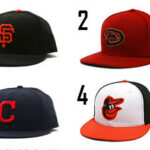Did you know it’s “prime rivalries” week in Major League Baseball?
It’s the first week of interleague games billed that way, designed to add a little hype to the traditional rivalries now that interleague games are played every day. So far, it’s been welcomed with a thud, since the teams in the biggest markets aren’t in particularly compelling battles.
So here we are in the middle of the pair of two-game series. Have you noticed anything different? Perhaps a special cap if not a special matchup? MLB encouraged teams to wear batting practice caps in some sort of nod to college football’s rivalry week. That fell flat, too, with many teams passing … so far.
Check your TV schedule and you’ll still see a lot of national attention given to Boston, Philadelphia and New York vs. New York. But here are the matchups they should have showcased if they truly want to develop a national following for “prime rivalries” week.
1. A’s vs. Giants: Party like it’s 1989 and dust off the MC Hammer. Oakland’s on a hot streak, winning five in a row and nine of its last 10, and the Giants aren’t far removed from that three-way tie for 1st. When you throw in the geographic rivalry and the (distant) World Series history, this is the truly prime rivalry of the week.
2. Diamondbacks vs. Rangers: It’s not traditional, but it’s the best matchup of the week when you rule out any geographic connections. Texas lost the Astros as an interleague rival, but gained them as a division rival in the same time zone, so overall it’s a win. As a bonus, their new “prime” rival creates a matchup of first-place teams, although the two are heading in opposite directions on current three-game streaks.
3. Reds vs. Indians: The battle of Ohio is a battle of contenders, one overachieving, and one trying to keep pace with the National League’s perpetual overachievers, the St. Louis Cardinals.
4. Nationals vs. Orioles: Two 2012 playoff teams in contention again, this Beltway rivalry seems poised to get pushed into the upper echelon. It’s surprising that national television hasn’t jumped at the chance on these two more often.
5. Red Sox vs. Phillies: You’ll be able to see plenty of them, despite both slipping in recent years. Boston seems to be back, but Philadelphia is continuing its 2012 wrestle with .500.
6. Tigers vs. Pirates: Two teams without natural geographic rivals in the opposite league, these two get to be dance partners in what turns out to be a pretty good matchup.
7. Royals vs. Cardinals: The Royals’ annual sacrifice to St. Louis comes at another perfect time, as the Royals entered its prime rivalry on a five-game skid and the Cardinals were more than happy to extend it.
8. Mets vs. Yankees: This matchup lacks some luster, but then again, that’s probably been true since 2000. That won’t keep it from being shoved down our collective throats.
9. White Sox vs. Cubs: This feels like it should be lower, but the White Sox’s surge to .500 has given it some life. Plus, they play for a Crosstown Cup. Throw out the record books!
10. Dodgers vs. Angels: Two big offseason spenders are already at the top of a different power rankings: the one for disappointing, underachieving teams. The Angels started digging out, but are still six games under .500, same as the Dodgers.
11. Brewers vs. Twins: The two last place teams have already contributed 14 innings and six hits from Jean Segura in one game. That’s got to count for something.
12. Mariners vs. Padres: Paired together like a game of musical chairs, these two were left without in 1997 and have been battling it out ever since. And 16 years has added zero intrigue or adrenaline to this rivalry. Maybe after a few more decades.
13. Rays vs. Marlins: Even Florida shrugs. Should be a cake walk for the catwalk kings.
14. Blue Jays vs. Braves: As forced as it gets, this matchup at least has World Series history from 20 years ago.
15. Astros vs. Rockies: A regular occurrence until Houston jumped leagues, there isn’t even any real National League rivalry history to fall back on. Most people will think this is a run-of-the-mill NL game, not a “prime rivalry.”

